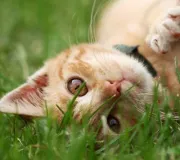Gardening is one of your great passions. You enjoy cultivating the soil, planting your vegetable seedlings, and tending them until it’s harvest time. Perhaps you’re a devoted flower gardener, tweaking your foliage and blooms until they develop striking shapes and colors. Because your golden retriever Bailey enjoys the great outdoors, maybe he’d like to share your satisfying hobby. Perhaps surprisingly, training your canine companion to behave in the garden will help strengthen your dog-owner bond. Ask your veterinarian for expert training advice during your dog’s next physical checkup. Meanwhile, here are some tips:
Rest and Relaxation
First, give Bailey an opportunity to practice his obedience skills. After leading him to a shady spot, issue a firm “Down-Stay!” command; and monitor his behavior. Provide him with cool water so he can stay hydrated while he relaxes.
Bathroom Break Spot
Because Bailey might need a potty break, establish an acceptable bathroom spot somewhere in the garden. Cover the area with pea gravel or wood chips. Train him to only complete his important business there; and praise him when he does that. If he chooses a different location for his puddle or poop activities, perform some retraining work.
Canine Garden Assistant
If your active companion seems itching to get moving, teach him to perform some garden tasks. Perhaps he can retrieve your kneeling cushion, tool bag, or sunhat. If he’s a strapping, strong pooch, he might enjoy pulling a small garden cart with seedlings or weeds for the compost pile.
Dedicated Digging Destination
Maybe Bailey has developed a garden excavation obsession. Clearly, he can’t continue that unacceptable behavior. Instead, give him a personal “digging spot” that’s separate from the rest of the garden. Fence off the area if necessary. Bring in his favorite toys so he feels comfortable there.
If you’re looking for creative ways to enhance Bailey’s play area, consider exploring “DIY Things Your Kids Can Make for Fido,” which can provide great ideas for homemade toys that kids can create for their pet.
When he creates an impressive hole in “his” spot, praise him profusely. If he switches the operation to a forbidden area, piling bricks in the hole might discourage him from finishing the job. Provide appropriate correction as well.
Landscaping Materials Solution
If Bailey stages a rebellion and tears wildly through the garden, consider scattering decorative rocks or pinecones throughout your green space. If these obstacles don’t disrupt his actions, perhaps the densely planted foliage will discourage him. Raised garden beds might deter your canine delinquent.
Our Advice on Teach Your Dog to Behave in the Garden in 2025
How can you create a restful area for your dog in the garden?
To create a restful area for your dog in the garden, lead them to a shady spot and command a “Down-Stay.” Monitor their behavior while providing cool water for hydration. This allows your dog to relax while practicing obedience skills, fostering a stronger bond between you. It’s essential for your dog’s well-being to have a designated place to unwind amidst gardening activities. For expert advice tailored to your dog’s needs, please consult your veterinarian during their next checkup in Treasure Coast, FL. Our “Vet Preventive Care” services can help keep your dog healthy, addressing issues before they become serious, and providing regular check-ups that contribute to a long and happy life.
What if your dog ignores commands and runs wild in the garden?
If your dog ignores commands and runs wild in the garden, it’s essential to address this behavior promptly. Consider scattering obstacles like decorative rocks or pinecones to deter their disruptive behavior. Raised garden beds can also serve as a deterrent. For more tailored advice on acclimating your dog to garden behavior, consult your veterinarian in Treasure Coast, FL. They can provide guidance specific to your dog’s needs, ensuring a harmonious relationship between your pet and your gardening hobby.
Are there common garden plants that are toxic to dogs?
Yes, several common garden plants are toxic to dogs. Examples include azaleas, lilies, daffodils, and tulips. It’s crucial for pet owners to familiarize themselves with potentially harmful plants and ensure they’re not present in their garden. If you suspect your dog has ingested a toxic plant, contact your veterinarian immediately for guidance. They can provide advice on how to manage the situation and prevent further harm to your pet.
How can you safely use pesticides or fertilizers in your garden if you have a dog?
To safely use pesticides or fertilizers in your garden with a dog, opt for pet-friendly products labeled as safe. Apply them according to the manufacturer’s instructions and keep your dog away from treated areas until they’re dry or absorbed. Consider using natural alternatives like neem oil or diatomaceous earth. After application, thoroughly rinse any surfaces your dog might come into contact with, such as plant foliage or soil. Additionally, store chemicals in secure containers out of your dog’s reach to prevent accidental ingestion or exposure. Regularly monitor your dog for any signs of illness or discomfort after gardening activities.
Are certain dog breeds more prone to digging or destructive garden behaviors than others?
Certain dog breeds are more predisposed to digging or destructive behaviors in gardens. Breeds like terriers, dachshunds, and huskies have innate instincts for digging, while high-energy breeds like border collies may become bored and resort to destructive behaviors. Understanding your dog’s breed tendencies can help anticipate and manage these behaviors. Providing proper exercise, mental stimulation, and designated digging areas can redirect their natural instincts in a positive manner. Additionally, early training and socialization play vital roles in preventing unwanted garden behaviors in dogs, regardless of breed. Regular supervision and consistent reinforcement of desired behaviors are essential for a well-behaved garden companion.
For more help acclimating your dog to the garden, contact your veterinarian in Treasure Coast, FL.

